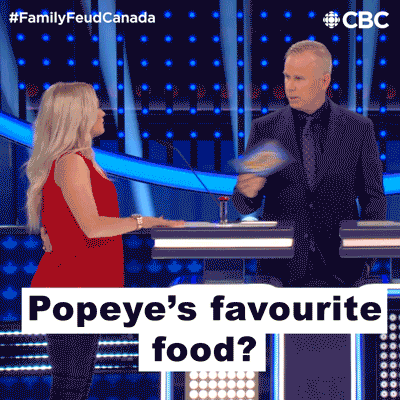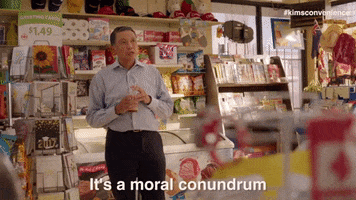Congratulations, You're Wrong!
Hello all,
Here’s hoping you survived the abrupt end of summer, and that you’re well underway with a transition to the steady rhythmic routine of fall.
Last newsletter we talked about making the ‘wrong’ choices, and I loftily claimed there to be no such thing! Our broad life choices can’t be categorized into the neat simple buckets of ‘right’ and ‘wrong’.. and doing so is simply a trick our mind uses to help alleviate our anxiety. (More specifically, these are called cognitive distortions - I wrote about this back in 2021, and you’ll find these to be a recurring theme in this newsletter. They are very common and easy to lapse into).
Breathe easy, I said in the last newsletter… there’s no such thing as “wrong”.
Ok, and I still wholly believe this about life paths or the long-term arc of our journeys.
BUT. It feels like recently, amidst escalating life busyness, for one reason or another (i.e. compounding complexity at work, trying to balance personal and work schedules)… I have found myself grappling more frequently with the reality of well, instances of being unequivocally wrong.
Multiple wrongs. In keeping with the fall vibes… just a whole cornucopia of wrongs:
The wrong call on hiring someone(s) - (i.e when to hire someone, who to hire)
The wrong call on timing to communicate something to a team
The wrong call on location/timing to book for a vacation (i.e. the entirety of the vacation is drowned out by monsoon season)
.. the list goes on.
And, of course, like you, anxious reader, each wrong creates in me an immediate, visceral reaction of URGH.

Here’s a theory on why. Annie Duke1 is a professional poker player who thinks a lot about correct and incorrect decision making, and describes below the specific asymmetry of being wrong. She references Daniel Kahneman and Amos Tversky (preeminent thought leaders on the psychology of judgement and well, being wrong).
…being wrong hurts us more than being right feels good. We know from Daniel Kahneman and Amos Tversky’s work on loss aversion, part of prospect theory (which won Kahneman the Nobel Prize in Economics in 2002), that losses in general feel about two times as bad as wins feel good. So winning $100 at blackjack feels as good to us as losing $50 feels bad to us. Because being right feels like winning and being wrong feels like losing, that means we need two favorable results for every one unfavorable result just to break even emotionally.
(Fun fact: Daniel Kahneman is my husband’s brain crush. He quotes stuff like this at me all the time… usually when I am moping and deep in an emotional spiral. He is one of those people that can rationalize exactly and quantifiably how sad one should be about certain mishaps.)
The concept described above by Duke of course, resonate hard. The ‘wrongs’ I mentioned above, feel so much more acute in my mind than the many other ‘rights’ I’ve made in recent history. Compounding the natural asymmetry of this is the persistent environment many of us find ourselves in, (especially in a work setting), where being right and wrong matter a lot.
Many of us work in tech, finance, in public companies, where a LOT of value is placed on being right:
Tech: if you pick the right problem to solve, and the right market to address, your growth and returns can be exponential
Finance: if you pick the right stock, or the right company to buy, and invest at the right price, you can earn literal multiples of money
Public Companies: if you operate in a way, or deliver profit in a way that your shareholders value, your stock price reflects its appreciation immediately… and vice versa
These are models where being the most right, and being the most right most consistently pay off in an absolutely massive way (a way that is so massive that the payoff almost completely loses its relationship to human effort - does it really make sense that innovations in our lifetime make some people billionaires by happenstance?)
Being wrong on the other hand, in these environments, is almost immediately quantifiable and made publicly known (stock price dips, running out of money, writing off an investment to zero, press releases).
Oddly, even professions where arguably, being right consistently is much much much more important than in any other industry… (like oh say, providing life saving medical care) doesn’t have these crazy reward structures.

On top of the work settings we find ourselves in, we also happen to be almost constantly steeped in a social media vacuum. 1) Everyone can find fault in us out there on the internet (i.e. someone out there is always going to think we’re wrong), 2) These opinions pick up steam via the algorithm vortex and 3) Our ‘wrongs’ are forever be memorialized online (in tweet, screenshot, text, video etc). Proof of not being correct can be referenced by anyone, at any time and used as repeated ridicule.
NO WONDER BEING WRONG FEELS SO BAD.
Now, I know our girl Annie, and our boys Kahneman and Tverseky gave us a neat little formula previously about exactly how to quantify being wrong. It’s 2x worse than being right… and yet, I feel like there’s an entire (unquantifiable!!) spectrum of being wrong.
The intensity of how bad it feels to be wrong varies… and I think it can be attributed to a few factors:
How high the stakes are
Obviously the stakes are higher in life saving medical care than in sending an email with typos. A mistake that puts someone in danger presumably has stakes that are higher than hurting someone’s feelings.. and yet..
The literal stakes are also coloured by the prevalent feelings associated with being wrong.
Regardless of where on the “actual danger” spectrum a mistake lies it’s also important to consider the environment: how others react, and/or what we let the said mistake mean about ourselves
Think of times where mistakes feel safe; the stakes are low, and the resulting feelings are generally positive and encouraging. You may be trying to create this kind of environment for your young children.
I think of mistakes I’ve made in recent travel plans with family or friends (see: rainy season, booking a tour on the wrong day). The stakes feel actually low, and the preexisting relationship and shared feelings I have with my stakeholders are overwhelmingly positive. It’s enough to feel apologetic, but not something to dwell on.
Then think of times where the stakes feel higher and feelings feel more negative or potent. This is where the feelings of shame, guilt, and general chaos tend to feel more amplified. I’ve thought about this a lot in two contexts that perhaps you can relate to…
Getting it wrong at work
As important as the actual stakes in one’s livelihood, for those of us that aren’t performing open heart surgery as part of our jobs, I’d argue the overarching culture of a work environment is as (if not more) important in shaping how the wrong feels. This branches out from the examples set at the highest leadership at a company, to each individual team/manager interaction.
How are mistakes treated? Are they shared publicly? Are they presented plainly, or with a “spin”? Are associated learnings shared? Is fallibility considered a negative or a virtue? Do people feel judged by their errors? Do they feel defined by their errors? Do people gossip about other people’s mistakes?
You can see how these elements contribute to a lack of psychological safety, a term coined by the Harvard Business School professor Amy Edmondson in 1999.2
If you feel like you have the overarching support of your manager, team, and company, you’re more likely to take risks, deliver honest feedback and admit to mistakes/errors. The company as a whole as is more likely to be innovative, and foster a stronger community.
This great piece by McKinsey outlines how as leaders and employees, we can foster more of this feeling in our workplaces.
For me, it’s been challenging and humbling to balance (coaching where concepts are more abstract and involve a lot of uncertainty and gut feelings), with a day job where being staunchly correct is such considered such a virtue.
Getting it wrong in coaching
This one feels particularly heightened for me lately - being wrong at something new, at something personal and aspirational, and most of all because the stakes feel the highest. The subject matter is so important: clients trust me with their questions, feelings and vulnerabilities.
But, as with any work or craft… coaching can’t be perfect. AND, the learnings from being “wrong” in coaching are rich. Coaching is very often rooted in instinct. Often without knowing much about the background or context details, coaching is meant to quickly synthesize or connect, reading the cues from their clients.
When I started in coaching training, I hated the idea of blurting out something wrong. I could see it now - my client (who was just starting to build trust with me) would recoil or cringe or hate me, and the coaching relationship would be ruined. Through training and practice, and now coaching clients, it’s not quite as catastrophic, although it takes considerable self-management to not freak out when this happens, and instead use it as a learning cue. If something triggers a strong negative reaction in a client, that can reveal as much information as when something lights them up. Coaching isn’t always just rah rah rah, you got this!
When is a wrong not valuable? I’ve had instances where I’ve ignored the signs that I’m on the wrong path when coaching a client, and pushed an agenda or thread that wasn’t resonant with a client. That’s a textbook example of poor self management of my ego, and results in a much worse coaching experience, not the initial mistake itself.
Welp. Now that we have a better understanding of why being wrong feels so acutely uncomfortable, and I personally have had time to process the urgh, and reflect on my most recent batch of wrongs, I hereby humbly offer a few final reflections on being wrong, particularly, on the wisdom of being wrong.
Yes, once we have recovered from the shame semitruck hit that accompanies being wrong… we might peel ourselves off the ground to reflect for a minute on the myriad of things we can learn from being wrong.
Being wrong can be good for us in a myriad of ways, that we tend to realize once we’ve processed it all.
Empathy ✅
Intentions ✅
Humility ✅
Self Awareness ✅
Growth ✅
The Wisdom of Being Wrong
Empathy: Being wrong gives us an understanding of our own fallibility, and in turn, the grace and empathy for others when they are wrong.
Managing a team requires this empathy frequently… sometimes the people we manage make the same mistakes that we made in our progression (easier to empathize with), and sometimes they make mistakes that are unfathomable to us (harder to empathize with, but still critical to try).
It’s helpful in those cases to look past the wrong itself to understanding how something went wrong, and someone’s intentions.
Intentions: you know how in elementary school math word problems, each question would be worth several points? You’d only get a single point for the actual final answer, but you’d get other points for showing your assumptions and ways of thinking along the way? “Showing your work” is what teachers call it… and oftentimes, even if the conclusion we come to is wrong, the path and intention behind it might be correct. Also - final outcomes are sometimes out of our control, but we can control the path of decisions we make to get there.
You might think you made the wrong call with a decision to abandon something - a project, or a career path. Maybe you left and then market conditions changed. The reflection and analysis process (the part that’s within your control) that led to your decision in the first place, is still infinitely valuable.
You might think you made the wrong call with your team - when to communicate something, when to grow the team. Yet, despite the outcome not being ideal, your intention was likely to solve for the greatest good of the team, and the sharing of your thought process and acknowledgement of where things went wrong may resonate meaningfully with your team.
In fact, the humility to share wrongs with the people you work with or lead, can result in improved culture and performance3
Humility: admitting fallibility is a admirable trait in leaders. It sets the tone at the top, and can actually create more motivation in their teams and employees.
However, it’s important to consider the “right amount'“ of humility to share. There’s a balance between admitting a mistake, vs admitting all of your mistakes and shortcomings in a way that no longer inspires confidence
Another way of thinking about humility, intellectual or otherwise, is being the right size in any given situation: not too big (which is arrogance), but also not too small (which is self-deprecation).
Humility, and knowing how much to apply, of course, requires a high degree of self-awareness.
Self-Awareness: our wrongs give us a deeper knowing of ourselves. What are the biases and preconceptions we came to a situation with in the first place that led us to assume something (eventually incorrect)?
I often come to situations assuming that “likability” is one of the most important factors which colors a lot of my decision making. There are situations where this is a correct assumption, and there are situations where this is incorrect. When I reflect on some of my wrongs lately - I gain even sharper perspective
And of course all of this is in service of our favourite concept…
Growth: If we aren’t making mistakes, and being wrong a healthy amount of the time …perhaps we’re not stretching ourselves enough to try new, uncharted things
Being right all the time feels great. How nice would it be to be known as the person that just ‘knows everything’. But if you’re in a situation of change (professionally or personally, this is basically inevitable), we simply cannot know everything. We will make wrong turns, wrong decisions and have a few dissidents (aka haters) along the way
Think about your performance reviews at work, both the ones you’ve received and the ones you’ve given. Has any review ever stated “And they just showed up on the job and did it perfectly?” More often than not, star performers are those that took feedback into account and grew with it.
And so, I leave you with this:
Making a mistake is one thing, letting it rob us of hope and boldness (aka NEVER moving past the urgh stage) is another, and arguably much more detrimental action than making the mistake in the first place.
Resources
“Thinking in Bets: Making Smarter Decisions When You Don't Have All the Facts” Annie Duke
The Curious Joy of Being Wrong (Scientific American)
On the topic of fall vibes - A fun article on rewatching Gilmore Girls, focusing on show MVP, the third GG, Emily (Lainey Gossip)
Learn more about me, and my coaching work here
And if you know someone that would find this helpful, please pass along:
“What is Psychological Safety” (McKinsey)






